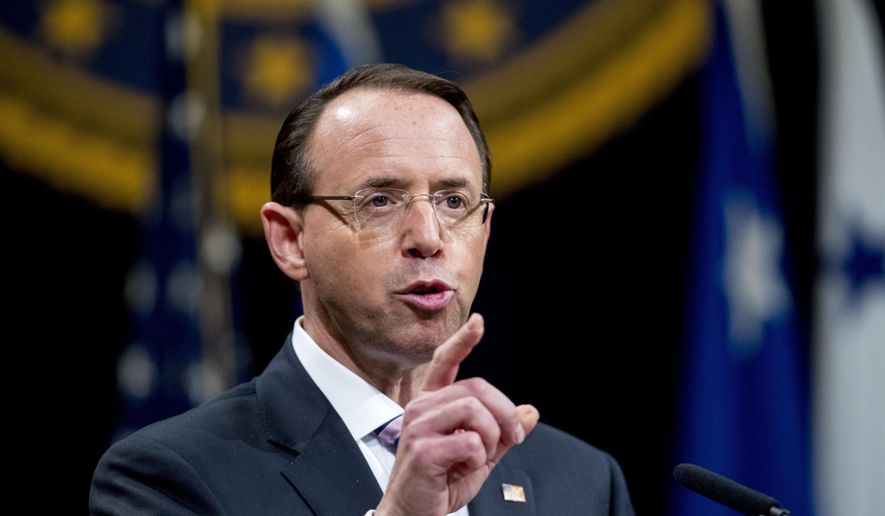Former Deputy Attorney General Rod Rosenstein put Trump campaign volunteer Carter Page under special counsel investigation after a year in which allegations against him in a Democratic Party-financed dossier had fallen apart.
The Justice Department on Wednesday released a less-censored “scoping memo” Mr. Rosenstein sent to special counsel Robert Mueller on Aug. 2, 2017. The memo authorized Mr. Mueller to target Mr. Page, retired Army Lt. Gen. Michael Flynn, campaign volunteer George Papadopoulos and former campaign manager Paul Manafort.
At the time, there was no evidence that any of the four conspired with Russia to interfere in the 2016 presidential election, outside of allegations in the dossier compiled by former British spy Christopher Steele. No evidence ever materialized and Mr. Mueller closed his probe without charging any Trump associate with conspiracy
The less-censored memo (compared to a version filed in court in 2018) revealed that Mr. Rosenstein targeted Mr. Page with this sentence: “Allegations that Carter Page committed a crime or crimes by colluding with Russian government officials with respect to the Russian government’s efforts to interfere with the 2016 election for president of the United States, in violation of United States law.”
The FBI first singled out Mr. Page for a counter-intelligence investigation in August 2016.
In the year leading up to Mr. Rosenstein’s scoping memo, several events damaged the FBI’s case.
In October, the FBI won a judge’s approval to start electronic and physical surveillance on Mr. Page that would last until the following September. Four warrant applications were based on dossier allegations that Mr. Page conspired with Russians in Moscow and worked with Manafort as a liaison to the Kremlin. The Department of Justice inspector general said Mr. Steele’s claims were essential to obtaining the warrants.
But in January, the FBI interviewed Mr. Steele’s main Russian source, who repudiated the dossier, saying he was just repeating gossip to the ex-spy.
What’s more, intelligence services told the FBI in early 2017 that the claims about Mr. Page were likely Russian intelligence disinformation. The Kremlin learned of Mr. Steele’s Democratic Party assignment in July 2016, making him a ready candidate for the Russian statecraft of feeding disinformation to try to destabilize the West. In this case, the target was candidate, and now president, Donald Trump.
In 2016, then-FBI agent Peter Strzok and other agents were reading Mr. Steele’s allegation of a vast conspiracy between the Trump campaign and Russia that never occurred.
Mr. Rosenstein also targeted Manafort and Mr. Papadopoulos with the allegations they colluded with Russia in the election. That did not prove true either.
Manafort is in federal prison after being convicted of income tax fraud. Mr. Papadopoulos pleaded guilty to lying to the FBI about the timing of his meeting with a London-based professor who learned in Moscow that the Russians had dirt on former Secretary of State Hillary Clinton. He served 12 days in prison and was released in December 2018.
The allegations against Flynn included that he committed a crime by talking to Russian government officials during the presidential transition.
That is an apparent reference to the 1799 Logan Act. Mr. Strzok interviewed Flynn on Jan. 24, 2107, at the White House with a goal of getting him to admit he violated the act. As a private citizen, so the legal theory goes, he was prohibited from discussing Obama foreign policy with Russian Ambassador Sergey Kislyak.
Flynn’s backers considered the ploy a joke since no one has ever been convicted of a Logan Act violation and no one had been prosecuted for more than a century. The Justice Department concluded that as a transition official he did not violate the law.
Flynn, who was briefly Mr. Trump’s national security adviser, pleaded guilty to lying to the FBI about the phone call. He has since repudiated the plea and on Thursday the Justice Department dropped its case against him.
After Justice released the memo via Senate Judiciary Committee Chairman Lindsey Graham, South Carolina Republican, the senator tweeted, “The legal foundation for Mueller’s appointment is crumbling.”
Mr. Rosenstein, who resigned in April 2019, rankled the White House on several occasions.
After Mr. Trump fired FBI Director James B. Comey in May 2017, Mr. Rosenstein moved quickly to appoint Mr. Mueller, who went on to investigate Russia collusion for two years. Mr. Rosenstein never consulted with the White House.
Also at that time, he discussed wearing a wire when he next met the president, according to former FBI deputy director Andrew McCabe.
• Rowan Scarborough can be reached at rscarborough@washingtontimes.com.




Please read our comment policy before commenting.